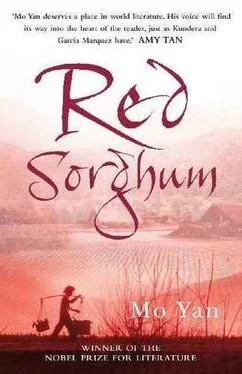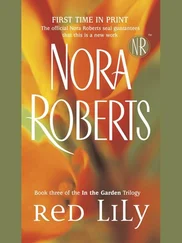Not daring to defend herself, she timidly approached the wagon, Father on her heels, and looked into the bed. The folds of the comforter were filled with black earth, revealing the lumpy outlines of whatever was underneath. She picked up a corner, but let it drop as though her fingers were scalded. Father glimpsed Second Grandma’s smashed, pulpy face and Little Auntie’s rigid, open mouth.
That open mouth called up all sorts of pleasant childhood memories for Father. He’d frequently gone to Saltwater Gap to spend a few days, against Grandma’s wishes. Granddad had told him to call Second Grandma ‘Second Mom,’ and since she treated him like her own son, he thought she was just wonderful. She occupied a special place deep in his heart and seeing her was like coming home. Little Auntie Xiangguan had a mouth as sweet as honey that was forever filling the air with gentle shouts of ‘Elder Brother’. This dark-skinned little sister was one of his favourites, and he was fascinated by the fine, nearly transparent fuzz on her face; most of all he loved her bright eyes, like shiny buttons. Yet, just when they were at the peak of enjoyment, Grandma would send someone over to drag him home, and he would look down at her from his perch in the arms of the messenger on the mule and feel terribly sad. He wondered why Grandma and Second Grandma hated each other so.
Father thought back to the time he’d gone to weigh the dead baby, a couple of years or so earlier. He’d accompanied Mother to the place called Dead Baby Hollow, some three li beyond the village. Since township tradition forbade the burial of babies under the age of five, the tiny corpses were abandoned out in the open. Traditional birthing customs were followed back then, and only the most rudimentary medical treatment was available, so the infant mortality rate was particularly high, and only the strongest survived.
I sometimes think that there is a link between the decline in humanity and the increase in prosperity and comfort. Prosperity and comfort are what people seek, but the costs to character are often terrifying.
When Father went to Dead Baby Hollow with Grandma, she was obsessed with the Flower Lottery, a small-scale form of gambling in which you neither fly too high nor fall too hard, which had captivated the villagers, the women in particular; since Granddad was enjoying a stable, prosperous life, the villagers chose him as the society head and banker. Placing the names of thirty-two flowers in a bamboo tube, he publicly drew out two a day, one in the morning and one at night. The herbaceous peony or the Chinese rose, maybe the common rose, maybe the prickly rose. The gambler whose flower was picked earned thirty times the amount she’d bet. Women caught up in the Flower Lottery devised all manner of methods to guess which name Granddad would draw. Some poured wine down their daughters’ throats in anticipation of babbled visions in their drunkenness. Others forced themselves to dream for the answer. Going to Dead Baby Hollow was Grandma’s unique and appalling method.
It was so dark that Father couldn’t see his hand in front of his face. Grandma had wakened him in the middle of the night, startling him out of a deep slumber and making him feel like screaming at her for frightening him like that. ‘Don’t make a sound,’ she had whispered. ‘Come with me to guess the flowers.’ With his natural curiosity and the promise of a good mystery, Father was immediately awake and eager to go. Quickly putting on their boots and caps, they tiptoed past Granddad and slipped out of the yard and the village. Because they proceeded with caution and walked very quietly, their passage went unnoticed even by the village dogs. Grandma was holding Father’s left hand, leaving his right hand free to carry a red-paper lantern; she was holding him with her right hand, leaving her left hand free to carry her special scale, on which the names of thirty-two flowers were carved.
As they walked out of the village Father heard a southeast wind whistling through the sorghum fields and rustling the broad green leaves; he could smell the Black Water River far off in the distance. After groping along for a li or so, he grew accustomed enough to the dark to distinguish between the brown road surface and the waist-high sorghum by the roadside. The soughing of the wind through the stalks added to the mystery of the dark night, while the screeches of an owl on one of the trees out there cast a patina of terror over the enigma of the dark night.
The owl was perched in a large willow tree directly above Dead Baby Hollow. Had it been daytime, Grandma and Father would have been able to see the growths of blood-red beards on the trunk of the tree, which stood in the middle of a marshy plot of land. Father sensed the owl’s green eyes flashing solemnly amid the willow branches. His teeth chattered and chills snaked from the soles of his feet all the way up to the crown of his head. He squeezed Grandma’s hand, feeling that his head was about to explode from the terror building up inside it.
A sticky odour clung to the air above Dead Baby Hollow. White drops of rain the size of brass coins fell to the ground, gouging out scars in the impenetrable blackness. Grandma tugged on Father’s hand as a sign for him to kneel down, and as he did so his hands and legs touched wild grasses growing in crazy profusion in the marshy land; the coarse, needlelike tips of leaves jabbed his chin, upsetting the harmony in his soul. He felt countless pairs of dead babies’ eyes boring into his back and heard them kicking, squirming, laughing.
Bang bang crack crack . Grandma was striking a flint against a piece of steel. Gentle red sparks illuminated her trembling hands. When the tinder caught fire, she blew on it, and a weak glimmer of light began to spread. She lit the red candle in the paper lantern, from which a ball of red light emerged like a lonely spectre. The owl’s song stopped as dead babies formed ranks to surround Father, Grandma, and the lantern.
Grandma made a search of the marshy hollow while dozens of moths slammed into the red-paper covering of the lantern in her hand. Her bound feet made walking difficult on the wild grasses and the soft ground. Father was curious to know what she was looking for, but didn’t dare ask. He followed her silently.
A rolled-up straw mat lay amid a clump of thick-stemmed, broad-leafed cocklebur. Grandma handed Father the lantern, laid her scale on the ground, then bent over and picked up the mat. In the red light of the lantern her fingers looked like squirming pink worms. The mat fell open to reveal a dead infant wrapped in rags. Its bald head was like a shiny gourd. Father’s knees were knocking. Grandma picked up the scale and hooked it to the rag shroud. Holding the scale in one hand, she adjusted the weight with the other. But with a loud rip the rag gave out and the tiny corpse fell to the ground, followed by the weight, which landed on Grandma’s toe, and the scale, which flew over and hit Father on the head. He yelped in pain and nearly dropped the lantern. The owl let out a hideous laugh, as though mocking their clumsiness. Grandma picked up the scale and jammed the hook through the baby’s flesh. The horrifying sound made Father’s skin crawl. He looked away, and by the time he’d turned back, Grandma was moving the weight across the arm of the scale, notch by notch, higher and lower, until it was in perfect balance. She signalled Father to bring the lantern closer. The scale glowed red. There it was: ‘peony’.
When they reached the village Father could still hear the owl’s angry screeches.
Grandma confidently put her money on ‘peony’.
The winner that day was ‘winter sweet’.
Grandma fell gravely ill.
As Father looked at Little Auntie Xiangguan, he recalled that the mouth of the dead infant also gaped; his ears rang with the songs of the owl, and he yearned for the moist air of the marshy land, since his lips and tongue were parched by a dry northwest wind that sent dust swirling in the sky.
Читать дальше












